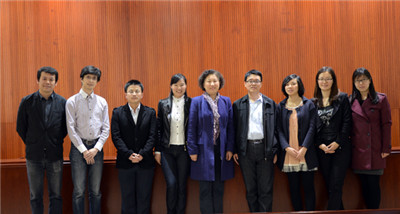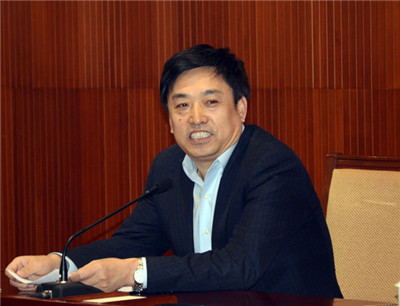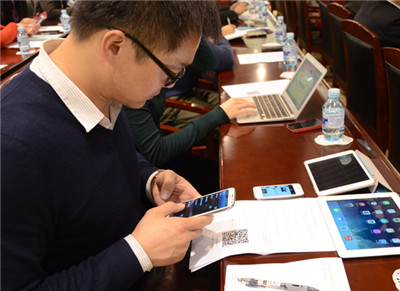 On March 26th, eight staff members from the Open University of China (OUC) were invited by the Party Committee of Departments directly under the Ministry of Education (MOE) to assist in the exchange and knowledge-sharing activity about information technology application known as “Information Technology Makes Work and Life More Convenient”, which was organized for the cadres within certain departments of the MOE.
On March 26th, eight staff members from the Open University of China (OUC) were invited by the Party Committee of Departments directly under the Ministry of Education (MOE) to assist in the exchange and knowledge-sharing activity about information technology application known as “Information Technology Makes Work and Life More Convenient”, which was organized for the cadres within certain departments of the MOE.
The Party Committee of the OUC organized the group which then presented the event, held in the MOE’s lecture hall.
Beginning in the 1760s, a scientific and technical revolution swept across the world, reforming human beings’ production methods and thereby changing the world. More than two hundred years have passed since the first scientific and technical revolution, and scientific advancements have continued to accelerate. As information technology reaches into all aspects of our life, via mobile phone, desk top computer, the Internet, etc, it is quietly influencing and changing our work, life, and future.
The application show selected some fantastic information technology applications which can help in daily work and life, not only enhancing the effectiveness and quality of work and life, but also inspiring peoples’ interests and enthusiasm in new technology. The activity attracted more than one hundred cadre participants from various departments of the MOE. Lv Yugang, the Executive Deputy Party Secretary of Departments directly under the MOE was present and hosted the activity.
With the development of information technology, computers and smart phones have become two indispensable tools in peoples' daily work and life. If the two tools can be linked and interact with each other, they become even more convenient for the end user. In addressing this issue, Cheng Gang, from the School of Education, displayed multi-screen interaction technology in his PPT presentation. By using this technology, seamless docking between smart phones and computers can be achieved via wireless LAN (Wifi hot spots). A smart phone can remotely control a computer-based PPT presentation, while the computer can also show and project the contents of the phone's screen. This technology is applicable to all kinds of reporting and demonstration activities, assisting staff to make presentations in a freer and more flexible way. Also related to the interaction between mobile phones and computers, Wang Xin, from the School of Engineering, shared another highly practical technology: Splashtop Remote Desktop Software, which is suitable for people always away on business trips. Users can make use of mobile terminal devices (IOS, Android systems etc.) to control desktop computers remotely by downloading the Splashtop software, allowing them access to and view all kinds of resources and documents on the remote computer, anytime, anywhere.
“Kaijuan” is a mobile library APP developed by the OUC. With its powerful functions and intuitive interface, it can provide users with many services including search, reading, and e-mail deliveries of all kinds of domestic academic periodicals, downloading of electronic books, and online reading of newspapers. In exhibiting the software, Ye Chao, from the OUC’s Library, demonstrated the installation, logging in, and operation of some frequently-used functions of “Kaijuan”. The “Kaijuan” APP can be used to help us find needed documents while on the go, obtain the newest information easily, and have great fun reading digital publications.
The trivial and complicated small tasks that make up office work not only waste time, but also decrease working efficiency. Chen Xiu, from the Academic Affairs Department, introduced a quite practical software-sharing cloud storage 360 Cloud Disk, which solves such difficulties as inter-platform storage, backup, deliveries, and sharing. The software not only has a large storage capacity, but also enjoys safe, portable, and stable features. Besides, it’s free. Therefore it is the best way for collaboration between staff in various departments. Inevitably, we have all encountered situations at work where e-mails need to be sent to hundreds of individual users and hundreds of certificates need to be printed. Wei Shunping, from the Scientific Research Department, introduced a method to merge e-mails, which can help quickly finish such complicated work in few minutes. The methods introduced by the two teachers are practical and easy to operate, and they have reinvigorated the office work environment.
Additionally, Wang Ran, from the School of Engineering, showed off the impressive functions of the Alipay Wallet as a modern financial tool; Tian Xiao, from the School of Engineering, shared speech recognition technology which is a convenient tool that can enhance life. Zhang Hongli, from the library, explored a new network set-up in which the PLC modem is used to solve the problem of incomplete wireless network coverage, based on her own experience. Even though these small discoveries were not eye-catching, they do bring great convenience to peoples' work and lives, which gives further evidence of the impact that information technology is having on peoples' productivity and way of life.
During the event, many people from the MOE took out their mobile phones or computers and followed along with the operations and applications as the teachers delivered their information technology presentations from the platform. Some people even put forward highly meaningful questions, leading to spirited interaction between the teachers and the audience. More than two hours passed by quickly, and the information technology application show came to an end with the participants still involved in spirited discussions. The brilliant and practical contents of the eight lectures won rounds of applause from the audience, with many people asking for more.
Lv Yugang expressed his sincere thanks to the eight teachers of the OUC, hoping that the activity would inspire peoples’ interest in information technology, and bring advanced technology to the workplace, thereby promoting information technology’s popularization and application among cadres in the departments of the MOE.
To make the activity run smoothly, the eight teachers from the OUC made diligent preparations. They not only made web pages for this special purpose, but also produced five-minute micro course versions of their new technology application presentations, which were then shared on the Five-Minute Lecture Website of the OUC.

Lv Yugang, Executive Deputy Party Secretary of Departments directly under the MOE hosting exchange activities

People enjoyed participating in the activities

Eight staff members of the OUC invited to demonstrate information technology applications
By Yu Hongchi, the OUC
Photograph: Wang Shuo